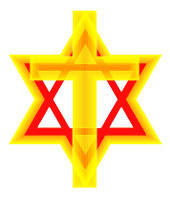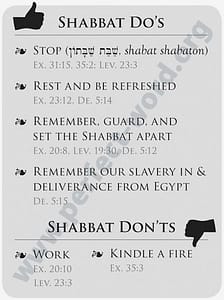Q:  Shalom Kevin. I have been raised as a Gentile Christian my whole life, but within the last year or so, I have been experiencing an ever-increasing draw towards the Messianic Jewish community. The Gentile Churches make me want to vomit and mourn; as they are straying farther and farther from Yeshua. My whole family is beginning to look at me strangely as my heart wants to forsake this thing called “Christianity,” and I long to embrace and understand the culture and ways of God from the Hebrew- and Jewish-Roots. I am very attracted to the Messianic Community, though I have not yet visited a congregation. I am a Christian who is crying out for help, and I want to disconnect from my paganistic Christian upbringing and come until full maturity in Moshiac by embracing our Jewish roots. Any guidance, info, or words of wisdom would be appreciated. Read more
Shalom Kevin. I have been raised as a Gentile Christian my whole life, but within the last year or so, I have been experiencing an ever-increasing draw towards the Messianic Jewish community. The Gentile Churches make me want to vomit and mourn; as they are straying farther and farther from Yeshua. My whole family is beginning to look at me strangely as my heart wants to forsake this thing called “Christianity,” and I long to embrace and understand the culture and ways of God from the Hebrew- and Jewish-Roots. I am very attracted to the Messianic Community, though I have not yet visited a congregation. I am a Christian who is crying out for help, and I want to disconnect from my paganistic Christian upbringing and come until full maturity in Moshiac by embracing our Jewish roots. Any guidance, info, or words of wisdom would be appreciated. Read more
This article was originally posted as a response to a comment on the post “Am I Really a Gentile?”
The tricky thing about DNA testing is that, like any kind of medical testing, interpretation of the results is not an exact science. Have you ever had a medical diagnostic procedure performed, then read the pathologist’s report? They often look something like this: “Well, it looks like Mr. Cohen could have such-and-such disease, but it could also be this other disease, or it may be nothing at all.” In other words, the doctors are taking their best guess as to what might be wrong with you, based on the conditions other people with similar test results have had in the past. Sometimes the doctors are right—sometimes they’re wrong. Sometimes you need more testing, and sometimes the tests never help your doctor devise a treatment. Way to go, science! Read more
The seventh-day Shabbat (Sabbath) is not only central to Israel’s calendar, it is at the heart of Jewish identity. Exodus 31:13 reports Adonai commanding Moshe to “speak to the sons of Israel, saying, ‘Surely, My Shabbats you must guard, for it is a sign between Me and you, to your generations, to know that I, Adonai, am sanctifying you….’” Yet the observance of Shabbat has historically been shrouded in rules and customs that can separate us from the very Shabbat we are supposed to be protecting. Beautiful, elegant—some-times strict—and infused with spiritual symbolism, the Shabbat traditions of Judaism nevertheless (and unnecessarily) complicate what may arguably be the simplest thing in Scripture.
While the practical out-working of Shabbat in the modern Diaspora does take some amount of forethought, the principles set forth in the Scriptures are easy to understand and apply—if we will only hear them. Indeed, wedged in our thinking is the belief that Jewish religion and culture supercede Scripture, and that centuries of practice amount to expertise. Not necessarily.
“How do I ‘do’ Shabbat?” is the question that kills Shabbat even before it begins. Candle-lighting, Shabbat dinner and special prayers are nice, but not what this holy day is all about. To “do” Shabbat, first consider the Scriptures (see image, above), and start by simply stopping. Don’t worry about going wrong with the way you “do” Shabbat… as long as you’re not going at all…
What do you think? Post a comment below.
This “Fast Foundations” article was originally published in Messianic Jewish Issues.
(Other extra-Torah or land-dependent Shabbat prohibitions include carrying a load out of one’s house or in through the gates of Jerusalem (Jer. 17:21-22), and buying from non-Israelites who are trying to do business in Jerusalem (Neh. 10:31, cf. 13:16). There are also explicit commands for Shabbat sacrifices. As for assembling for the purpose of worship, the Shabbat itself is a sacred assembly (Lev. 23:3), but what constitutes assembly, where, and of whom is not stated. Assembly of at least some members of Israel at the Tabernacle/Temple may be implied by Numbers 10:2&10.)




